#nina einstein
Text
Will we ever get anything quite like Code Geass again?
I don't think it's possible.
Code Geass is Japanese nationalist propaganda disguised as a global political drama, disguised as a military mecha show, disguised as yaoibait, disguised as a teen melodrama, disguised as a high school romcom, disguised as a Pizza Hut commercial...
...except those layers aren't layers at all, but are instead comingled in a giant snake ball of insanity.
The lead writer, Ichirō Ōkouchi, only ever worked as an episode writer for other shows prior to Code Geass, and never took the helm of an anime series ever again. And it shows. [EDIT: Several people have pointed out his other lead writing credits to me. So I misread Wikipedia—sue me. I maintain that this guy is a better episode writer than he is a lead writer.]
The minute-to-minute pacing is impeccable from a mechanical standpoint, with tension and stakes rising to ever-higher peaks, balanced out by the slow simmers of the b-plot and c-plot. It keeps the viewer on the edge of their seat at all times. Meanwhile, the large-scale plot is the most off-the-wall middle school nonsense I've ever seen, continually surprising the viewer by pulling twists too dumb to have ever have been on their radar—and therefore more effective in terms of raw shock value.
"Greenlight it!" was the mantra of this anime's production. It must have been. It has, in no particular order, all of the following:
Character designs from CLAMP, the foremost yaoi/BL group in Japan at the time—for characters who are only queer insofar as they can bait the audience, and only straight insofar as they can be more misogynist to the female cast.
Speaking of the female cast, hoo boy the fanservice. We've all seen anime girls breast boobily, with many cases more egregious than Code Geass, but there's something special about it happening immediately after—or sometimes in the middle of!—scenes of military conflict and ethnic cleansing.
Pizza Hut product placement everywhere, in every conceivable situation. High-speed chases, light slice-of-life scenes, intimate character moments, all of it. Gotta have Pizza Hut.
The anime-only Pizza Hut mascot, Cheese-kun. He wears a fedora.
The most hilarious approximations of European names—which I would love to see more often, frankly. Names like, I dunno, "Count Schnitzelgrübe zi Blanquezzio."
A depiction of China that is wholly removed from any modern reality, with red-and-gold pagodas, ornamental robes, scheming eunuchs, and a brainwashed child empress. There's a character named General Tsao, like the chicken.
Inappropriate free-form jazz in the soundtrack, intruding at the most unexpected times.
A secret cabal not unlike the Illuminati, run by an immortal shota with magic powers, holding influence all across the world, at the highest levels of government. They matter for approximately three episodes.
An unexpected insert scene of a schoolgirl using the corner of a table to masturbate. She's doing it to thoughts of her crush, the princess Euphemia—because she believes Euphemia to be as racist as she herself is, and that gets her off. This interrupts an unrelated scene of our protagonist faction planning their next move, which then resumes as if uninterrupted.
Said schoolgirl, in a fit of hysteria, threatens to detonate a worse-than-nuclear bomb in the middle of her school. She then goes on to develop an even more destructive version of that bomb, and become a war criminal, in a chain of cause-and-effect stemming from the moment she finds out that Euphemia wasn't actually that racist.
A character called "the Earl of Pudding."
A premise that asks us to believe that the name Lelouch is normal enough that he didn't need to change it when he went into hiding as an ordinary civilian. "No, that's not Prince Strimbleford von Vanquish! That's our classmate, Strimbleford Smith."
The collective unconscious, a la Carl Jung, within which the protagonist fights his villainous father for control over the fate of humankind. After this is over, the anime just keeps going for about ten more episodes.
An episode in which a mech tosses a giant pizza.
A gay yandere sleeper agent who can manipulate the perception of time.
Chess being played very badly, even to the untrained eye. Lelouch frequently checkmates his opponent by moving his king. This goes hand-in-hand with the anime's crock of bad chess symbolism.
A fictional drug that can most succinctly be described as "nostalgia heroin."
Roller-skating mecha in knightly armor, and some of the most sickass mecha fight choreography that I've seen.
I could go on and on, but I think you get the picture. This anime is what the average Westerner in 2006 thought anime was, and it was made in a confluence of factors that cannot be replicated. I've never had so much fun watching something that I found so... insulting. Repugnant. Ridiculous. Baffling. I love it sincerely.
Catch me cosplaying Lloyd Asplund at a con sometime, or maybe even the big gay loser himself, Lelouch vi Britannia.
#code geass#anime#lelouch vi britannia#rolo lamperouge#nina einstein#kallen kozuki#lelouch lamperouge#clamp manga#lloyd asplund
4K notes
·
View notes
Text
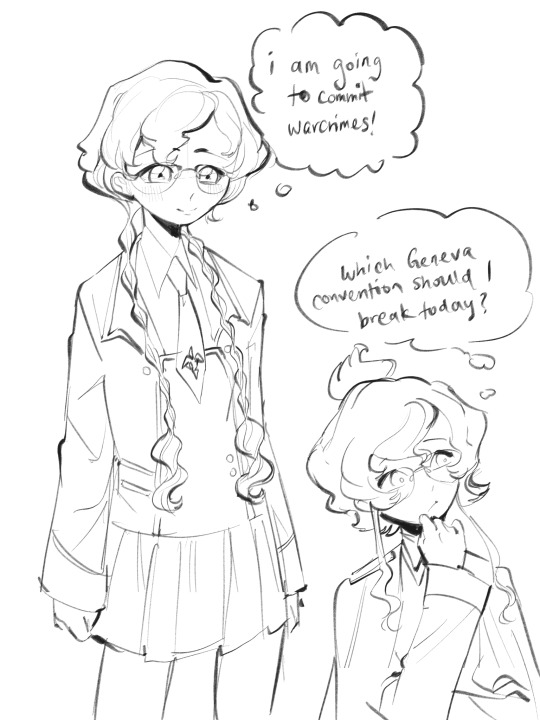
she is a v v funny little lesbian
58 notes
·
View notes
Text
12 characters, 12 story arcs, 1 theme

A few days ago, I tried to synthesize in a single word the narrative arcs of the Code Geass characters (at least, the ones I know they have) with the intention of extracting the theme of each one. I will briefly explain my conclusions. Or, put another way, what each theme means for each character. I'll leave Lelouch for last because he's the main character and his theme is supposed to be that of the series. We go from bottom to top.
Self-fidelity / Milly: "the girl who learned to be in touch with her own desires and chose to be true to herself to bring out her best version." I think the phrase explains it perfectly. Milly found happiness and she became more mature once she decided to stop serving her family's wishes and focus on herself and what she wanted to be and do.
Confidence / Ohgi: "the man who learned to trust himself to become the leader his organization and his country needed." Ohgi's arc is inspiring, if you take off your toxic fandom glasses and take his journey seriously. It is true that he made certain mistakes, but he always thought of the welfare of his people and his comrades. That was his main motivation and what led him to overcome his personal insecurities. I was going to make a comparison, but you guys won't like it and you'll attack me.
Happiness / Euphemia: "the girl who dreamed of a world in which all people were happy." This is the only arc that was cut short and did not come to fruition for reasons that I don't need to detail. Euphemia was a selfless princess without a purpose until she met her brother again and wanted to restore happiness to him, Nunnally and the rest of the Japanese.
Truth / Nunnally: "the girl who had to discover the truth to grow up to become the empress who could rebuild a new Britannia." She is literally blind and cannot see the world as it is, but as it should be (hence her idealism). She also can't see through her brother's and her friend's lies, until her determination and her circumstances push her to do so. It doesn't seem strange to me that the breaking of the seal coincides with the moment in which she learns the truth and decides to face it.
Justice / Nina: "the girl who had to seek justice for the murder of her beloved and her own acts and thus be a better person." Nina's arc is a revenge arc. Obviously. But the anime gives it a negative treatment, as Nina only gets worse with each new chapter. It's not until she understands all the destruction that her revenge can cause (in a literal sense) that she stops and reconsiders. The Zero Requiem gives Nina the opportunity to redeem herself and give justice to her beloved since the culprit pays for her crime. It's at this point that she begins to heal.
Honor / Jeremiah: "the man who managed to win back his honor after offering his loyalty to his enemy." The entire arc of Jeremiah revolved around honor. He believed that he had failed his empress and his prince, made a fool of himself on a live broadcast, was demoted and fell to the bottom. From there, he only lived to seek revenge. But then again, it wasn't the way. He only redeemed himself by putting himself at the service of a lord worthy of his loyalty: his enemy.
Humanity / Rolo: "the murder weapon that regained humanity from him through love." Another phrase that explains itself. Rolo had been used and manipulated his entire life as a tool. But when he created good memories and a sincere bond with Lelouch, he started to make decisions, think and feel like a human being.
Forgiveness / Shirley: "the girl who learned to forgive thanks to love." We find another arc of revenge. Like Nina, Jeremiah, Suzaku, and Lelouch, Shirley lost someone important to her, was overcome with grief and rage, and was tempted by revenge until she discovered that the killer was the man she loved. In the end, her noble feelings prevail and her love gives her the strength she needs to forgive.
Freedom / Kallen: "the girl who embraced her freedom became a hero who fought to liberate her country and the world." This is going to sound strange, but I barely realized that Kallen is who she is because she is free due to a fanfic that featured an anti-Kallen who was in many ways trapped. Kallen is a free spirit and performs as an autonomous individual. She chooses the friends she wants (be it Britannian or Japanese), she loves the man she wants, she champions the cause she wants, she has the value system she wants. However, there can be no freedom without equality, and Kallen and her people live in a society that promotes inequality. The freedom of some (the Britannians) cannot coerce that of others (the Japanese and even half-blood like her). So Kallen works to change the world to a place where everyone has full freedom. That's her motivation to grow up and become the hero her people and the world need.
Love / CC: "the girl who only until she received love from others was able to love herself." CC's arc ties directly to Lelouch's because they both express a nihilistic philosophy. In short, CC wishes to end herself and the world (through the Ragnarök Connection) because she considers her immortal existence to be meaningless and thus unimportant. Worse still, an immortal life implies eternal pain. Something she can't live with. But she wants to be loved, because all human beings cannot live without love. It is in the nature of the human being to give and receive love. Therefore, love will always prevail in the darkest moments. So, when Lelouch offers his affection to CC, she becomes more human and renews her will to live (see how her arc connects to Rolo's arc). Let's say that she transitions from a negative nihilism to an agathonism (that philosophy that it proposes that you have to enjoy life and help to live a pleasant life).
Peace / Suzaku: "the boy who was able to find peace of mind by creating a peaceful world." Without going any further, the lever that moves Suzaku throughout the series is "guilt". Suzaku feels guilty that he killed his father, he feels guilty that the Japanese are oppressed by the Britannians, he feels guilty that he failed Euphemia in his duty as a knight, he feels guilty that he can't protect everyone… Guilt, guilt, guilt. What is the opposite of guilt? We may all think of different things, but I'm leaving for peace because Suzaku didn't make peace with himself until he got the punishment from him and when did that happen? When he made sure to create a new world with Lelouch with the Zero Requiem, in which all his loved ones could live. No wars, no racism, no terrorism, no hate. In peace.
Will / Lelouch: "the boy who twisted the will of others found the value of the will of the human being and began to dream of tomorrow." It's very ironic. Lelouch's Geass is described as the power capable of bending the wills of others to the mercy of his own. As he progresses on his journey and interacts with other characters, he realizes that human beings actively seek happiness and persist despite adversity. They doesn't give up when they falls, but gets up and continues to fight. That is what it is to be human. Arthur Schopenhauer, in fact, said that the will was the essence of the human being. But I think that the approach of Lelouch and Code Geass goes more for nihilism in its most positive aspect. The one who proposes the destruction of everything to establish new values that allow the übermensch to live in freedom. "Emperor Charles searched for the past, you search for the present. But I search for the future. […]. Because no matter how much time passes, people will continue to search for happiness. People who struggle with sadness, those who seek the future. How everyone keeps wishing for happiness. Human nature is the reason I chose Geass and wearing a mask." This is the key to human survival. This is the meaning of life and what this series wants to teach you.
If you start to examine each of the arcs, you will see that they are all connected in one way or another (after all, they are concepts that appeal to the human condition). And, if you reflect carefully, you'll realize that the arcs of our two main heroes (Lelouch and Suzaku) correlate with the extremist views of Charles and Schneizel respectively (this was something I was planning to address in a discussion on CG antagonistic figures).
I hope you have learned something or found something interesting in this post. If you liked it, don't forget to support me with a comment and/or a reaction. I would really appreciate it as that will help the algorithm.
PS: Don't ask me to come up with an exhaustive analysis of the philosophies raised in this series. Although it may not seem like it, I have a hard time handling philosophy (I don't mind going overboard like I did here).
#kallen kozuki#kallen stadtfeld#code geass: lelouch of the rebellion#lelouch lamperouge#code geass#kallen#lelouch#suzaku kururugi#lelouch vi britannia#code geass: hangyaku no lelouch#euphemia li britannia#c.c. (code geass)#rolo lamperouge#ohgi kaname#shirley fenette#nunnally vi britannia#nunnally lamperouge#nina einstein#jeremiah gottwald
127 notes
·
View notes
Text

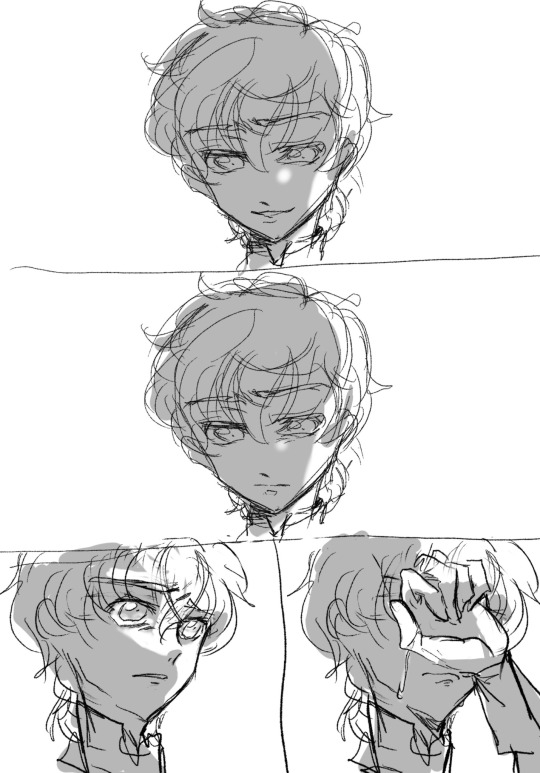


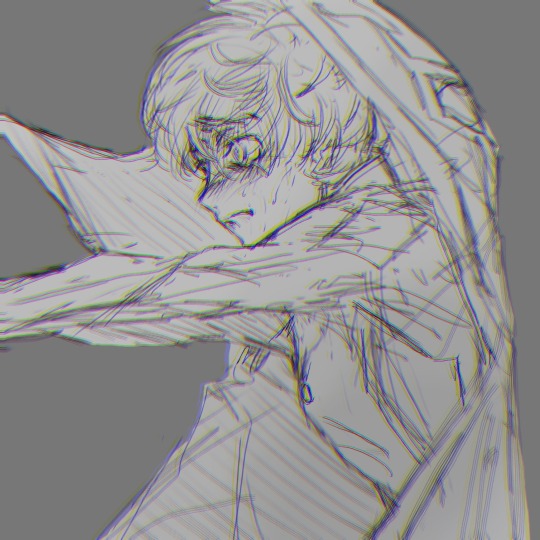
60 notes
·
View notes
Text

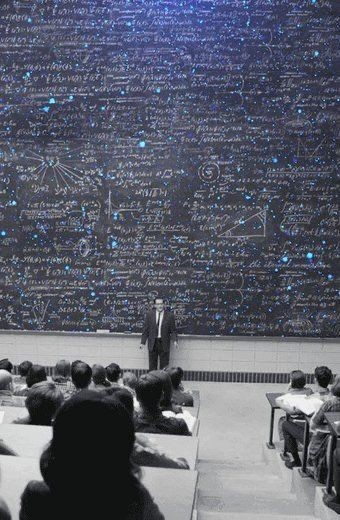
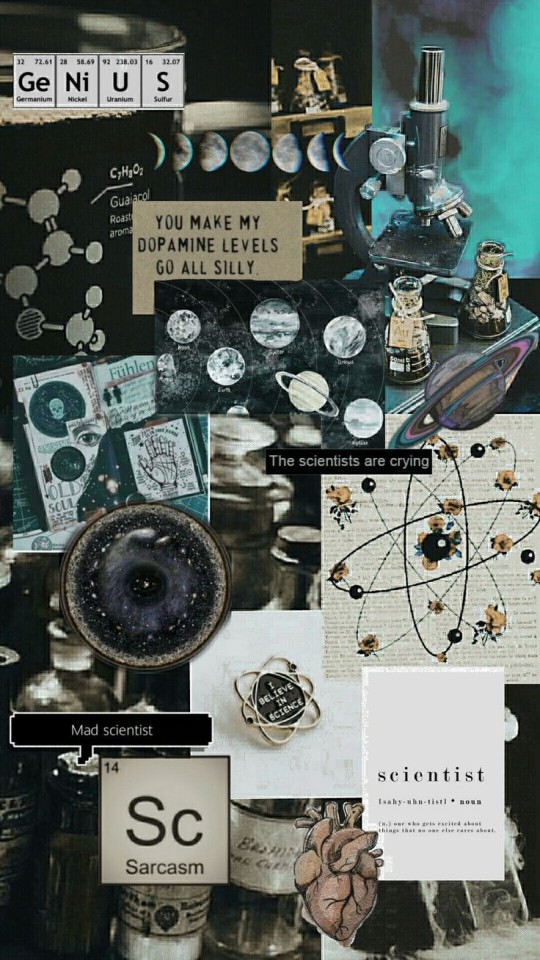
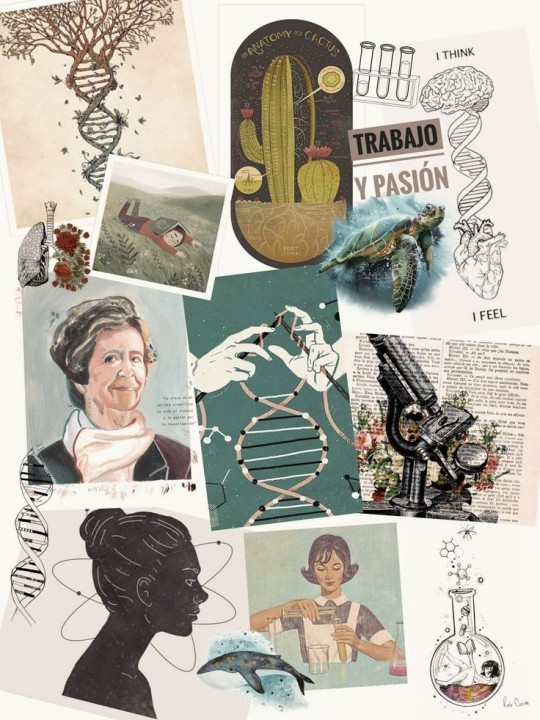


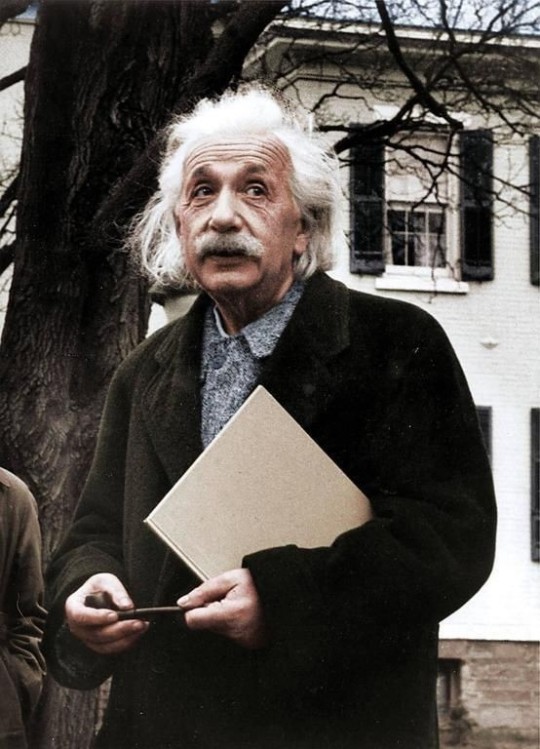

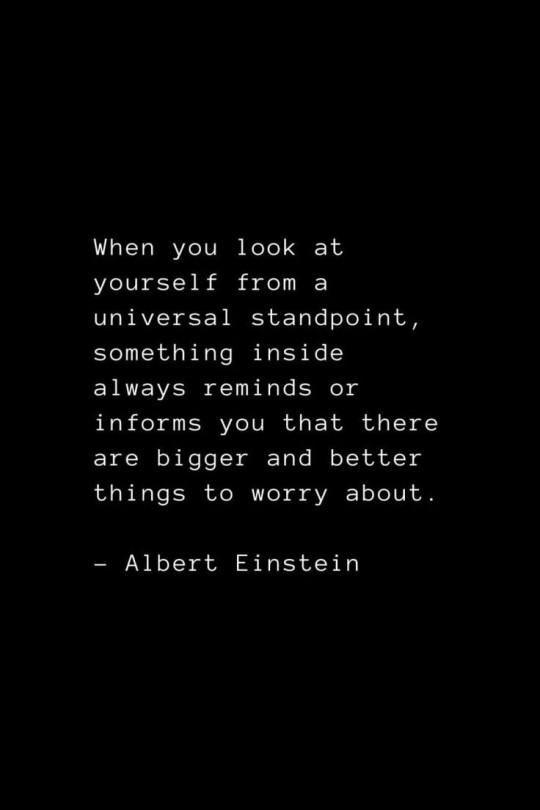

#2014 aesthetic#dark edgy#philosophy#poem#2014 tumblr#grunge tumblr#punk#cats#tumblr grunge#2014 revival#einstein honkai#nina einstein#science#social science#physics#quantum physics#greek philosophy#german philosophy#philanthropy
75 notes
·
View notes
Text

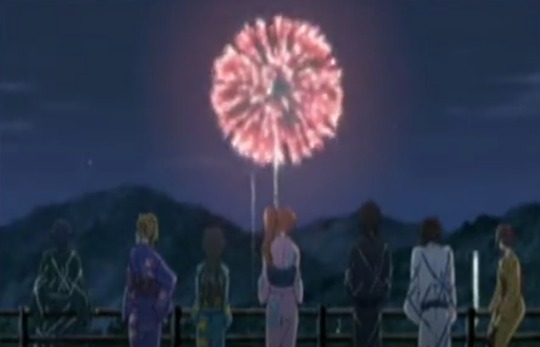
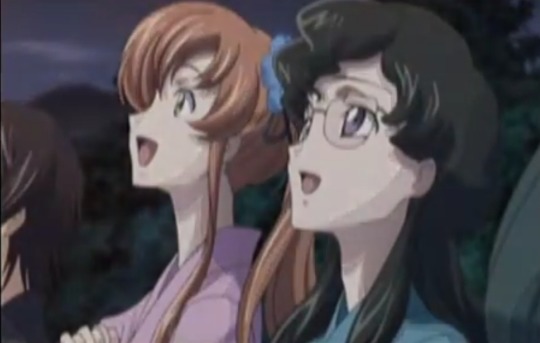
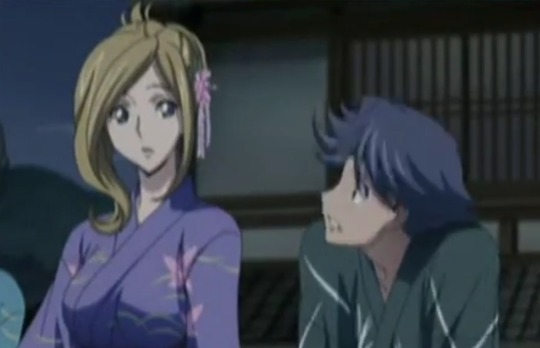

Summer festival in Code Geass: Lost Colors (PSP)
#lelouch#lelouch lamperouge#lelouch vi britannia#suzaku kururugi#suzalulu#shirley fenette#nina einstein#milly ashford#kallen kozuki#kallen stadtfeld#rivalz cardemonde#SORRY FOR THE SHITTY QUALITY THIS IS A GAME FROM 2007#code geass#code geass lost colors
112 notes
·
View notes
Text
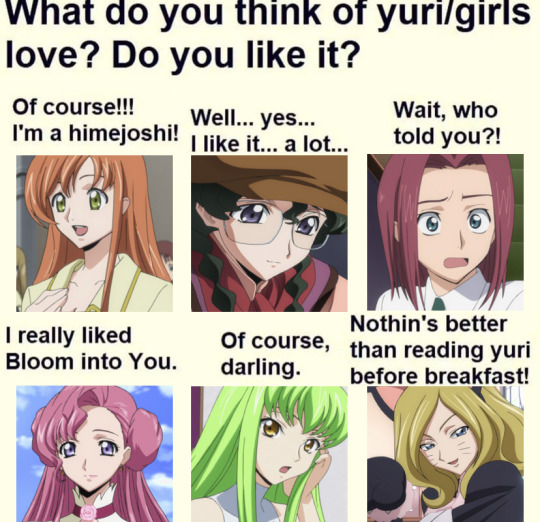
#code geass#shirley fenette#nina einstein#kozuki kallen#euphemia li britannia#c.c.#milly ashford#memes
31 notes
·
View notes
Text
Suzaku: Whoa, speak of the devil. Uh... Well, you guys got here quick.
Shirley: (gasps) I thought we were gonna die...
Nina: I think we already did... My soul's barely tethered to my body.
Rivalz: Urp—gonna puke...
Suzaku: O...kay?
Lelouch: My apologies, Kallen, but I request you steer clear of the driver's seat from now on. I only have so many lives left...
Mario: (inarticulate, weak groan)
Milly: Mario's unconscious. Wake him up.
Suzaku: Hey, Kallen. What happened?
Kallen: Um... I was just driving normally... I think.
#code geass#incorrect quotes#rivalz cardemonde#kururugi suzaku#shirley fenette#nina einstein#lelouch lamperouge#lelouch vi britannia#mario disel#milly ashford#kallen kozuki#source: persona 5 strikers#mod: LP
20 notes
·
View notes
Text
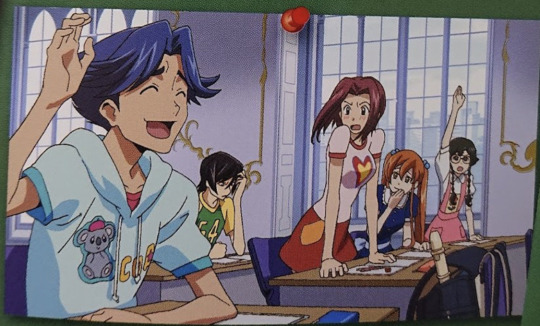
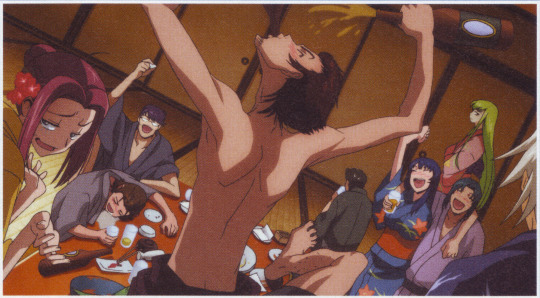
The Code Geass we deserved (Damn I don't even remember where the first pictures is coming from -second one is from the game Lost Colors i'm sure of that)
The first one with all of them dressed as kiddos ? Why don't we have any fanart of that (and what did Rivalz said to have Kallen react this way ? And why is Shirley laughing ? And why is Lelouch grumpy ? SO MANY QUESTIONS)
#code geass#lelouch of the rebellion#code geass lost stories#rivalz cardemonde#shirley fenette#lelouch lamperouge#kallen stadtfeld#kallen kozuki#nina einstein#code geass fumoffu#it's all in the original and not in the alternative#lelouch vi britannia
63 notes
·
View notes
Text

By Mizuto.
#rolo lamperouge#lelouch lamperouge#nunnally lamperouge#suzaku kururugi#c.c.#shirley fenette#rivalz cardemonde#nina einstein#milly ashford#euphemia li britannia#Arthur#Arthur the cat#code geass#Mizuto#blushing
38 notes
·
View notes
Text

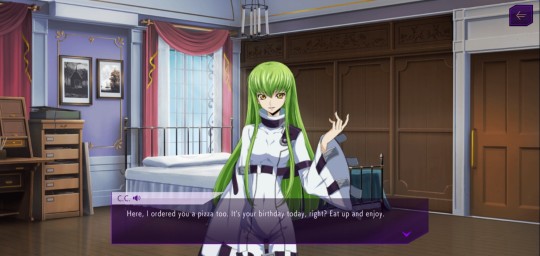


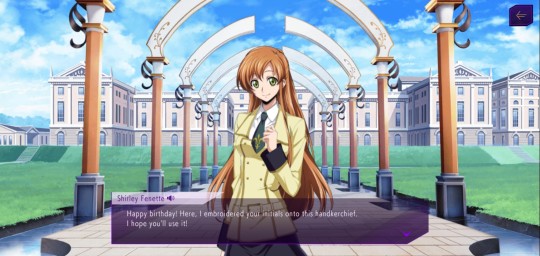
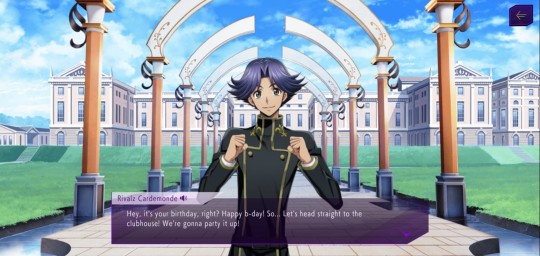

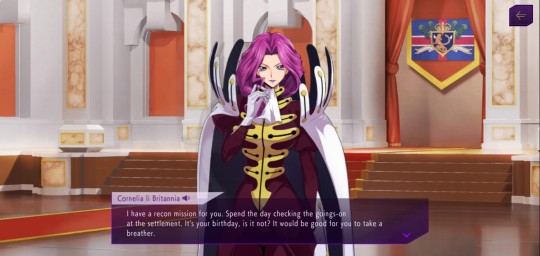
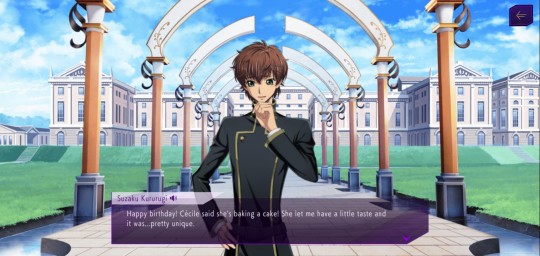

Birthday wishes....even if Cornelia telling me go back to work.
#code geass lost stories#lelouch vi britannia#c.c.#kallen kozuki#suzaku kururugi#shirley fenette#nina einstein#nunnally vi britannia#rivalz cardemonde#euphemia li britannia#cornelia li britannia
5 notes
·
View notes
Text
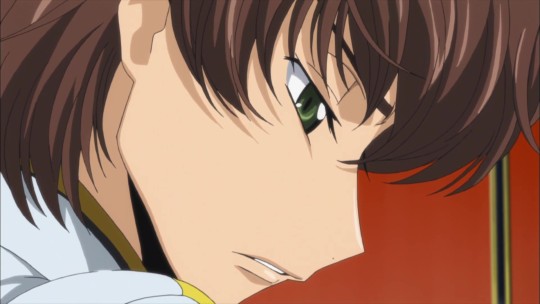

"why are you crying" because this is how suzaku and kallen look at nina while she's collapsed on the floor crying they just see a human being they see the her underneath the flaws and the wrongs and the trauma
#fans think they'd hate her because of some of the things she's said#but they don't#they have hearts of gold#code geass#code geass lelouch of the rebellion#nina einstein#code geass nina#nina code geass#kallen kozuki#suzaku kururugi
23 notes
·
View notes
Text
Lelouch: How did you get the entire Student Council to betray me? What did you offer them?
Milly: I asked them if they wanted to embarrass you and they instantly said yes.
#incorrect code geass#incorrect quotes#code geass: hangyaku no lelouch#code geass#lelouch lamperouge#milly ashford#lelouch vi britannia#the student council#student council (code geass)#kururugi suzaku#kallen kouzuki#kallen kozuki#kallen stadtfeld#suzaku kururugi#nina einstein#shirley fenette#nunnally vi britannia#rivalz cardemonde#nunnally lamperouge#there are many ways to do this and this is one
105 notes
·
View notes
Text
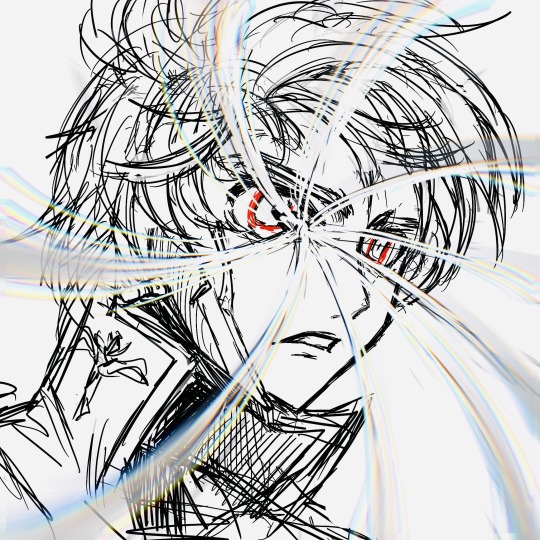
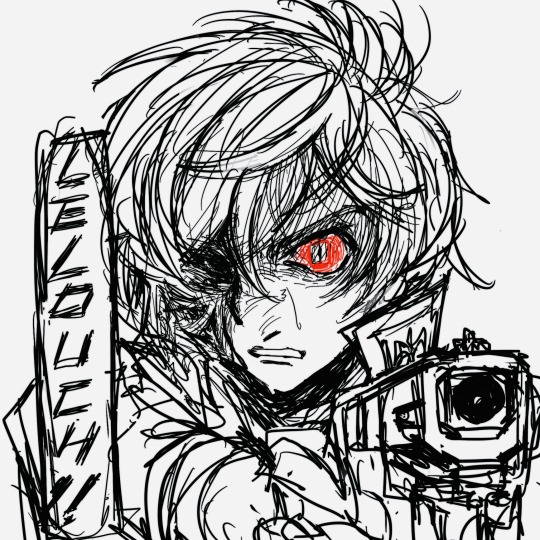
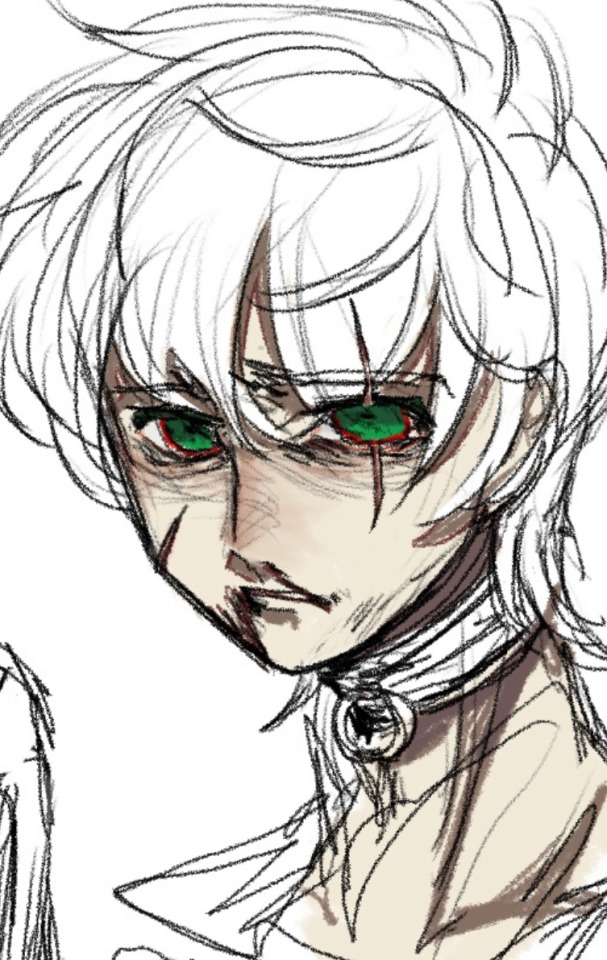

44 notes
·
View notes
Text
Nina and Shirley are two sides of the same coin and I'm going to show you
To begin with, both girls have in common that they are Britannians, friends of Lelouch and, above all, they are innocent citizens who find themselves in the crossfire of a rebellion against their mother country. In a certain way, they play the role of the civilians involved in a conflict of this type and, in unison, the two give totally opposite answers to the same problem.
Both lose an important being in their lives because of Zero. Shirley loses her father and Nina loses the girl she loves (that's emotional dependency, really; just this isn't the post to delve into that). As a result, Shirley and Nina go through a mental breakdown and it leads them to make morally questionable decisions with destructive consequences for themselves and their environment. I mean, they both choose to get revenge by killing Zero.
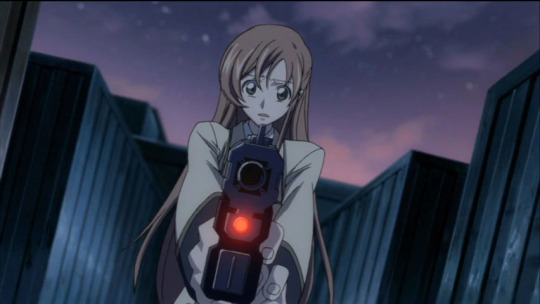
Shirley is about to do so when the golden opportunity falls at her feet, but she hesitates as soon as she discovers the identity of her father's killer. Villetta arrives, Shirley shoots her after seeing that she intended to arrest Lelouch and her guilt upsets her. Are you seriously doubting Shirley's mental state because of the trauma? She was in an obvious catatonic state by the time Lelouch located her next to Mao and already in R2 she threatened to kill herself because she couldn't handle the stress and shock.
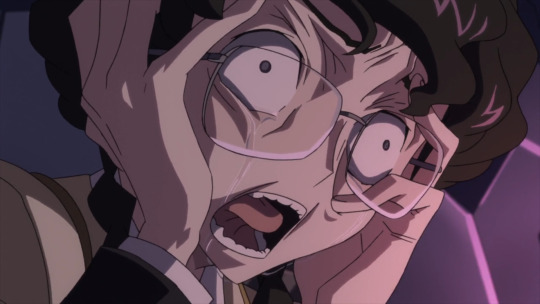
From Nina I have to prove her terrible mental health. She threatens to blow up Ashford Academy to avenge her late love and later joined Schneizel's research team in order to fulfill her revenge, which is to develop a weapon of mass destruction.
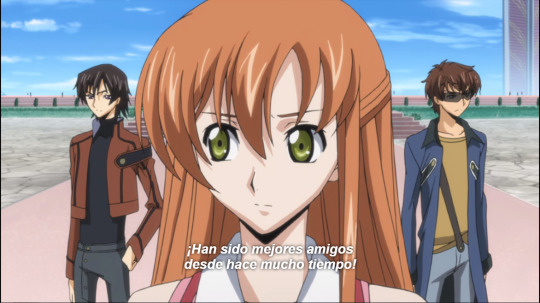
The difference between the two is that Shirley reconsiders and abandons her revenge because she is incapable of hurting someone she loves. In the end, love prevails over the rancor that lives in her heart, allowing her to forgive Lelouch for his crime. Nina, on the other hand, allows herself to be consumed by the hatred that has poisoned her heart and the poison has clouded her mind, preventing her from seeing the long-term effect of her actions.
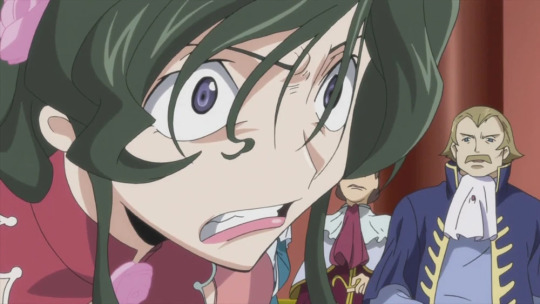
I think this is the case because Nina had problems from before that Shirley didn’t (insecurities, low self-esteem, maybe some past traumatic experience that she never got over). Hence, Shirley was able to pull herself together while Nina plunged deeper and deeper into darkness until she reached what I like to call, in my own narrative theory, "The Pinnacle of Destruction" (yes, that moment when Suzaku massacres the Tokyo Settlement with the F.L.E.I.J.A.).

That is precisely the point of divergence between the two. Nina has a revenge arc and revenge is usually treated in fiction as a process of self-destruction, which is the obvious case with Nina: she doesn't just degenerate as a scientist in the sense that she invests her great intelligence for selfish and warlike ends. , but also degenerates as a friend (behaving disgustingly with people who held her in high esteem) and, by extension, as a human. But she's not really like that. Lelouch says that she is a good person in R2 episode 24 (watch it if you don't believe me). Shirley doesn't lick her wounds like Nina. Her process is regenerative. That is, to let go of the pain and heal the internal wounds caused by the rebellion.
We could say that Nina represents hate and revenge, while Shirley symbolizes love and forgiveness.
To mention one case where this is evident: think of Suzaku's arrival at Ashford Academy. Nina has embraced the hatred that Britannia instills in its citizens towards the colonists and, therefore, she avoids Suzaku at all costs (as if he were a virus), but Shirley rejects that hatred. In fact, if it weren't for Rivalz, she would have been the first student at Ashford Academy to welcome Suzaku (she corrected herself by being the first to thank him for helping Lelouch).

In the long run, love and forgiveness are the two values that win out because even after Shirley dies, Nina is willing to forgive Lelouch (which she doesn't quite do, but at least she doesn't shut down completely) and she resents the friends she treated badly in the past and that she loves deep down. This is the only way that Nina decides to face her xenophobia and heal (as the secondary material shows us).
Anyway, I would like you to appreciate both answers equally. Don't take Shirley for a fool or naive or Nina for a lunatic or hateful. Individually these arcs are well written. Simultaneously they complement each other perfectly since it allows us to evaluate the opposite scenarios without the need for us to let our imagination run wild. It's one of those things where you're like, "Wow! What a great narrative!" But maybe I'm asking too much of you.
Have you noticed this parallel before? Did I convince you that they are two sides of the same coin?
PS: I just realized that Shirley is an ESFJ and Nina is an INTP. They are opposite MBTI Types, that is, same cognitive functions ordered in reverse (like Lelouch and Kallen, who are INTJ and ESFP, and Suzaku and Lloyd, who are ISFJ and ENTP). Coincidence?
#nina einstein#shirley fenette#shirlulu#code geass#code geass: hangyaku no lelouch#code geass: lelouch of the rebellion
31 notes
·
View notes
Text


Code Geass: Lost Stories 1.5th Anniversary ads in a subway station
#lelouch#lelouch lamperouge#lelouch vi britannia#code geass#code geass lost stories#akito hyuga#suzaku kururugi#c.c. (code geass)#kallen kozuki#kallen stadtfeld#oh god everyones there i cant tag them all#nunnally#nunnally lamperouge#rivalz cardemonde#shirley fenette#milly ashford#nina einstein#villetta nu#jeremiah gottwald#clovis la britannia#charles zi britannia#cornelia li britannia#lloyd asplund#cécile croomy#rolo lamperouge#anya alstreim#li xingke#tianzi#kaguya sumeragi#gino weinberg
33 notes
·
View notes